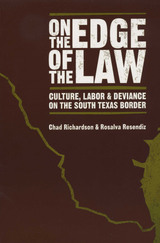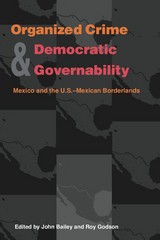3 start with O start with O

The Valley of South Texas is a region of puzzling contradictions. Despite a booming economy fueled by free trade and rapid population growth, the Valley typically experiences high unemployment and low per capita income. The region has the highest rate of drug seizures in the United States, yet its violent crime rate is well below national and state averages. The Valley's colonias are home to the poorest residents in the nation, but their rates of home ownership and intact two-parent families are among the highest in the country for low-income residential areas. What explains these apparently irreconcilable facts?
Since 1982, faculty and students associated with the Borderlife Research Project at the University of Texas-Pan American have interviewed thousands of Valley residents to investigate and describe the cultural and social life along the South Texas-Northern Mexico border. In this book, Borderlife researchers clarify why Valley culture presents so many apparent contradictions as they delve into issues that are "on the edge of the law"—traditional health care and other cultural beliefs and practices, displaced and undocumented workers, immigration enforcement, drug smuggling, property crime, criminal justice, and school dropout rates. The researchers' findings make it plain that while these issues present major challenges for the governments of the United States and Mexico, their effects and contradictions are especially acute on the border, where residents must daily negotiate between two very different economies; health care, school, and criminal justice systems; and worldviews.

In sunbaked Terlingua, Texas (pop., a few hundred), residents joke that there is a musician under every rock. Located ten miles from Mexico in one of the remotest corners of the United States, the town had a recording studio before it had a school, a well-stocked grocery store, or even a water utility. Open jam sessions are a daily ritual, and some songwriters make a living from their craft despite being thousands of miles from New York or Nashville. Why does such a tiny and isolated place ring with singing and guitars?
Based on more than two years of on-the-ground research, On the Porch tells the story of this small but remarkable community. Chase Peeler invites us into the music, introducing us to a cast of characters as unique as the town itself. He reveals how novices and experts perform together—a rarity in contemporary America. He recounts the devastation brought on by a border closure and describes how music is once again uniting people across the Rio Grande. He considers the impact of gentrification in an off-the-grid paradise, and how this threatens to transform a precarious musical ecosystem. On the Porch is a celebration of human musicality, of the role that music plays and can play in our lives, both in Terlingua and beyond.

The United States–Mexico border zone is one of the busiest and most dangerous in the world. NAFTA and rapid industrialization on the Mexican side have brought trade, travel, migration, and consequently, organized crime and corruption to the region on an unprecedented scale. Until recently, crime at the border was viewed as a local law enforcement problem with drug trafficking—a matter of “beefing” up police and “hardening” the border. At the turn of the century, that limited perception has changed.
The range of criminal activity at the border now extends beyond drugs to include smuggling of arms, people, vehicles, financial instruments, environmentally dangerous substances, endangered species, and archeological objects. Such widespread trafficking involves complex, high-level criminal-political alliances that local lawenforcement alone can’t address. Researchers of the region, as well as officials from both capitals, now see the border as a set of systemic problems that threaten the economic, political, and social health of their countries as a whole.
Organized Crime and Democratic Governability brings together scholars and specialists, including current and former government officials, from both sides of the border to trace the history and define the reality of this situation. Their diverse perspectives place the issue of organized crime in historical, political, economic, and cultural contexts unattainable by single-author studies. Contributors examine broad issues related to the political systems of both countries, as well as the specific actors—crime gangs, government officials, prosecutors, police, and the military—involved in the ongoing drama of the border. Editors Bailey and Godson provide an interpretive frame, a “continuum of governability,” that will guide researchers and policymakers toward defining goals and solutions to the complex problem that, along with a border, the United States and Mexico now share.
READERS
Browse our collection.
PUBLISHERS
See BiblioVault's publisher services.
STUDENT SERVICES
Files for college accessibility offices.
UChicago Accessibility Resources
home | accessibility | search | about | contact us
BiblioVault ® 2001 - 2024
The University of Chicago Press









